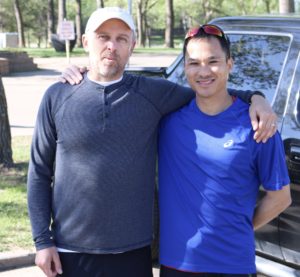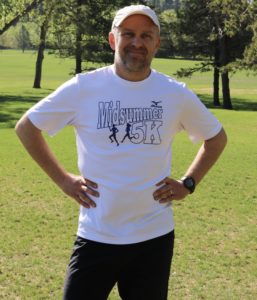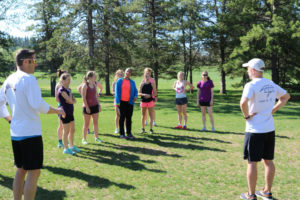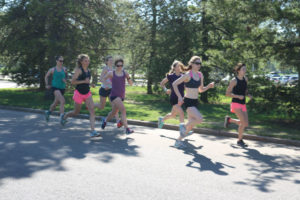 Four years ago, I had the privilege of meeting Matt Norminton, the running coach of the Running Room Athletic Club (RRAC). I was ready to return to racing and I wanted some company to run my workouts. Little did I know I was about to run with some very fast company. When I gave him my personal best time back then for the 10km, I still remember him saying that I would be one of the slowest runners in the group. If I didn’t mind, I was welcome. I figured being last was not a problem. A guy has to start somewhere.
Four years ago, I had the privilege of meeting Matt Norminton, the running coach of the Running Room Athletic Club (RRAC). I was ready to return to racing and I wanted some company to run my workouts. Little did I know I was about to run with some very fast company. When I gave him my personal best time back then for the 10km, I still remember him saying that I would be one of the slowest runners in the group. If I didn’t mind, I was welcome. I figured being last was not a problem. A guy has to start somewhere.
After a year of “running” Elevation Physiotherapy and running very infrequently, I have felt the desire to train and to race again. So, a month ago, I approached Matt if he would be willing to create a program for me. Matt is a very accomplished runner himself and he has contributed immensely to the running community. It is my privilege to interview him in this month’s blog.
Matt works as the Director of Purchasing and Logistics at The Running Room. He is also the Athletics Coach for Concordia University and the Running Room Athletic Club. He is a Level 2 coach and is working towards his Level 3. He graduated with a Bachelor of Secondary Education with a major in General Sciences and a minor in Mathematics. As a runner, Matt’s personal best times in the 5km is 14:36, 30:15 in the 10km, 1 hour 7 minutes in the half marathon and 2 hours 20 minutes in the marathon. Matt coaches many runners from track runners to marathoners, from University students to Masters athletes like myself. He is currently coaching several marathoners who are running 2:20’s to 2:30’s and 10km runners in the sub 32’s to sub 30’s. Here are my questions for Matt:
1.Matt, thank you for taking time out of your busy schedule to do this. What sports did you play when you were young and how did you get involved in running?
Matt: I played hockey and soccer mostly. I ran mostly for fitness for these 2 sports and to miss a day of school. I didn’t run seriously until grade 11.
2. Briefly describe your running career and accomplishments. How much are you running now and what are you training towards?
Matt: I am not running as often now as in the past. I don’t have any specific goals currently other than to stay fit.
Some of my past accomplishments include the following:
- CIAU 2nd place Cross Country Nationals when our team also placed 2nd
- 2000: 6th place in the 5000m National Championships
- 2001: 4x800m National Champion relay team member
- 2nd place South of England Cross Country Championships
- Winner 10,000m Inter-county Championships in England
- 2nd place Canadian in the Ottawa Marathon with a 2:20 Personal Best
- Winner of the Eugene Marathon
3. Who are some of the most interesting runners you have ever competed against?
Matt: Paul McCloy was one of the most competitive Canadian runners I had the privilege of racing against. He has more National Cross Country appearances than anyone. He had terrible form but he was a tough as nails runner and is a really great guy.
John Downes is an Irish legend who got the best of me in the South of England Championships in the mud and then told jokes all the way back to London on the train. He is one of the funniest guys I’ve met.
Reid Coolsaet is one of the best Canadian marathoners in the last 10 years. He was an up-and-comer when I was finishing up my University running career. He actually did a sub 4 minute mile on his skateboard!
4. How did RRAC get started? Who are its members and what are the criteria for running with the Club?
Matt: I started the Club for myself, for my wife Jen and Kip Kangogo so that we had a club to race for on track and to qualify for Athletics Alberta funding. To this day, it still serves that purpose. We are an “A” Club with Athletics Alberta. The Club has changed over the years and is now the Club I use to coach my runners. Essentially, the Club is open to anyone who is a good person and who shows up for practise. However, time standards apply in order to be a sponsored athlete plus the athlete must be a positive influence for the running community.
5. In terms of training programs, what do you think are the key differences between a track athlete and a middle distance runner and a marathoner?
Matt: The biggest difference between middle distance training versus marathon training is the amount of speed endurance work needed for a middle distance runner (not a big priority for a marathoner) and the amount of marathon paced work needed for a marathoner (not a big priority for a middle distance runner). When you boil most good training programs down to their basics, they all look pretty similar in the early phases. However, as you get closer to the goal race or season, the training needs to change and become more specific to the race or distance. Good training programs move from general work to more specific work the closer you get to your goal race or season.
6. Two years ago, I remember Tom McGrath, who is a 2:20 marathoner winning the MidSummer’s 5km race in Edmonton. When I spoke to him afterwards, he said to me that he hardly ever trained at that pace. How is it possible for a marathoner to win a 5km race against some very good short and middle distance runners who practise that pace regularly? Is volume and mileage then the key to successful middle distance running?
Matt: Tom was super fit that year and probably could have done well at 3k! Most middle distance races are still done primarily with your aerobic system, even the 1500m is mostly aerobic, so the fitter you are aerobically, the better you can do over most middle distance races. Volume or mileage is certainly one of the most important ingredients when putting together a good mid-distance program. However, that’s not to say hard workouts aren’t important but I do think some workouts are better than others, especially at certain times of the training cycle. You can fit almost any workout into a training cycle, the key is doing the workout at the right time of the training cycle. Not all workouts are good workouts in a training plan.
7. Could you provide an example of a less than appropriate workout at a wrong time in a training plan?
Matt: For a marathoner, it wouldn’t make sense to perform a 20k run (at your goal marathon pace) early on in a training cycle. You need to get fit enough and do some marathon pace training over some shorter distances before performing this workout. If you can handle this workout at your goal marathon pace in your first week or two of training then you probably need to aim higher on race day! Similarly, you wouldn’t want to do this workout the week before your race as it may not leave you feeling the freshest on race day. The other thing to keep in mind is that a workout can change drastically by altering the pace, total volume or rest between intervals. That’s why it’s important to do some planning before your buildup and break the buildup into phases and then do workouts that are specific to those phases of training along the way. Specific doesn’t always mean faster/shorter workouts. For longer distance runners, it means to go longer at your goal race pace. If a marathoner can do 30k at their goal pace, or a 5k runner can do 2-3 x 2k at their goal pace, or a 10k runner can do 2-3 x 3k at their goal pace then all of these runners should hopefully be close to hitting their goal on race day! This is of course assuming they are doing all of the other necessary things along the way.
8. I notice that most of your workouts for the short and middle distance runners tend to be shorter: mile or km repeats, 20min repeats etc. Do you think longer tempo workouts should be reserved for the marathoners and shorter tempo’s for the middle distance runners? Is this the specificity that you are referring to?
Matt: The types of workouts are certainly related to the race distance you are training for especially as you get closer to the goal race. I wouldn’t give a 1500m runner a 25k marathon pace run. Nor would I recommend a workout of 3x(4x200m) at 800 meter pace with 30 seconds rest between repetitions to a marathoner! I personally think tempo workouts are great for all runners (and can be done during most buildups) and short repetitions are still great for marathoners (my marathoners do a ton of hills!).
9. What are your thoughts on Lydiard’s method of training of base building (low aerobic/easy running) then hill training for strength and only then speed workouts thereafter? I notice in your training programs that you will do some of each even in the base building period.
Matt: I’m a huge Lydiard fan and a fan of periodization. However, I wouldn’t simplify the training as you have mentioned. Lydiard’s “hill phase” is a lot different than what most people do for hills. He had his runners bound up hills (basically plyometrics) for strength. I also wouldn’t say he only did speed workouts after the hill phase.
10. I notice that you use long runs as easy/recovery runs. Do you ever recommend runners use them as workouts: progression runs, fartleks, faster finish etc?
Matt: I don’t tend to do a lot of this, sometimes for the marathoners early on in the training cycle to break things up a bit. I think the long run is hard enough coupled with 2 hard workouts and a bunch of running and strength work that I’m not sure the pros outweigh the cons by doing them as workouts. There are some knowledgeable coaches who recommend these for runners so I think it works for some people, but they don’t really fit with my program.
Matt: Yes, for Masters athletes, I will decrease the weekly volume and the volume in workouts. I give the option as well of running only 2 workouts instead of 3 for a week and recommend cross training instead of running as well. I’ve never tried a 10 day cycle with any of my athletes.
Matt: I think for the shorter races (half marathon or less), it is worthwhile to run a few races before the goal race. Frank Horwill (famous BMC or British Milers Club) used to suggest doing a race longer than your goal and then another shorter than your goal before racing. Obviously this would be tough for a half but for a 10k you could do a 15k, then a 5 miler and then your 10k race. But you cannot do all 3 back to back to back…so maybe 3 races over 4 to 5 weeks would be fairly ideal. The shorter the goal race, the more races you can run closer to the goal race. It is not uncommon for track athletes to race 3 or 4 times over the course of 2 to 3 weeks at the end of a season when they are super fit.
13. Hypothetically speaking, let’s say a 3:30 marathon runner has been off for 6 months due to a stress fracture and is now ready to resume training. If this runner’s goal is to race in another marathon, what would his/her training program look like? When should his/her next race be scheduled?
Matt: Six months is a long time to be off. I might suggest the runner get at least 6 months of running and training before even starting to train for another marathon. I think it is best to ease back into running gradually. I would even suggest 1 to 2 cross training sessions per week rather than returning immediately into full running. This is where communication between the athlete and coach is key. I coach adults so if they tell me they are ready to start again, I am going to take their word for it. The runner’s long term health is my number one priority. They need their bodies when they are done with running.
14. What do you see as a common thread among successful runners you have coached?
Matt: Consistency in training. Also, patience to not rush or force the training and also a mental toughness when it comes to racing. You have to be willing to hurt. Running races is not very comfortable. Resiliency to injury or being smart enough to know when you are on the edge of injury are also important. One of my runners does this really well and is not afraid to cross train when she doesn’t feel quite right.

Collaborating with Matt with regards to injured runners has been a real asset to my clinical practice.
15. What do you see as a common thread among runners who frequently get injured?
Matt: One thing I have noticed is that runners who trained really hard or too hard when they were young (under 18) tend to get injured more often. Also, older runners who used to be fast runners also seem to get injured perhaps, re-living old glory days? But injuries are a fact of life in running. Sometimes even the person who does everything right still gets hurt. Training hard is tough on the body. The people who push their easy or recovery days too hard also tend to get hurt a bit more.
16. What do you love most about coaching? What do you like the least?
Matt: Helping people achieve their goals, no matter what they are, is super rewarding. Runners for the most part are also usually pretty great people! I am not a huge fan of meetings or paperwork and politics but I think that is just my general attitude in life. I prefer to be out doing rather than talking about doing!
Thank you, Matt Norminton for your dedication to your work, your sport and to the athletes you train….and for this interview!
Submitted by Albert Chan





